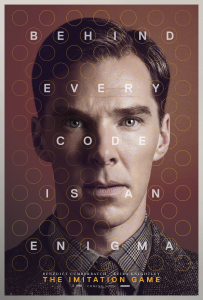
Kevin Enners, Staff Writer
In the midst of World War II, as the Allied forces and Axis powers killed droves of soldiers, mathematician Alan Turning is elected by British forces to decrypt Nazi code. Famously leading a motley crew of scholars, linguists, chess champions and intelligence officers. Alan was credited for cracking the unbreakable German code. Turning’s story is a remarkable one, but falls apart on the big screen.
Benedict Cumberbatch portrays Alan Turning in the adaptation “The Imitation Game.” Though Cumberbatch plays Turning quite excellently, the film’s plot is skeletal and can be hard to follow at times. Instead of retelling the tale in a linear fashion, this bio-pic is a distorted mishmash of incidences that happened before, during, and after Turing’s secret workshop deciphering codes. So instead of having a complete understanding of the struggles that faced Alan and his team, the film is a jigsaw puzzle that the audience has to piece together. After two and a half hours, this is a laborious task to undertake.
As a movie-buff, I want to be entertained. “The Imitation Game” was like a bad history class taught by an unorganized teacher. This film captures the history and illustrates Alan’s perseverance, but it still has two large flaws. First, it fails to connect Alan to the audience. His struggles are significant, but his problems may reside in his reclusive tendencies, arrogance and his overall inability to make friends. Second, the movie begins in the early 1950’s and jumps around to certain events that took place in Turning’s life, making it difficult for the audience to follow.
Nominated for four Golden Globes, the film received none. Films are supposed to be intriguing, colorful and tasteful. As Catherine Shoard of The Guardian puts it, “The Imitation Game simply isn’t very stirring. It’s neither turkey nor lion, a solid three-star job.”
Its vanilla storyline is a buzz-kill. In the winter of 1952, investigating a robbery reported by Alan, British officials enter Turning’s home and end up arresting him and charging him with gross indecency because of his homosexuality. They didn’t have the slightest idea that Turning would go on to become the pioneer of modern-day computing. The movie then stumbles from scene to scene, present to past. In 1951, we meet a Scottish detective (Rory Kinnear) who is looking into a burglary at Turning’s apartment. He thinks Turning could be a spy. Turning is, in fact, not a spy. But the investigation continues until 1953- where the movie begins. It cycles through the timeline like a broken record.
Moreover, the movie felt cluttered. Perhaps in an irrational attempt to keep the audience’s attention, the filmmakers made a montage of scenes that took place at different times during Alan’s life. The film zigzagged from Alan’s adulthood to when he was a student at Princeton University and back. During Turning’s lifetime, he had not been celebrated for his integrity. Rather, he was dismissed as an outcast. He was convicted for his sexual orientation and was forced to make a life altering choice to make up for his “perversion.” The tragic events that follow this choice are only skimmed over in the film, not allowing Cumberbatch to truly shine in this role.



